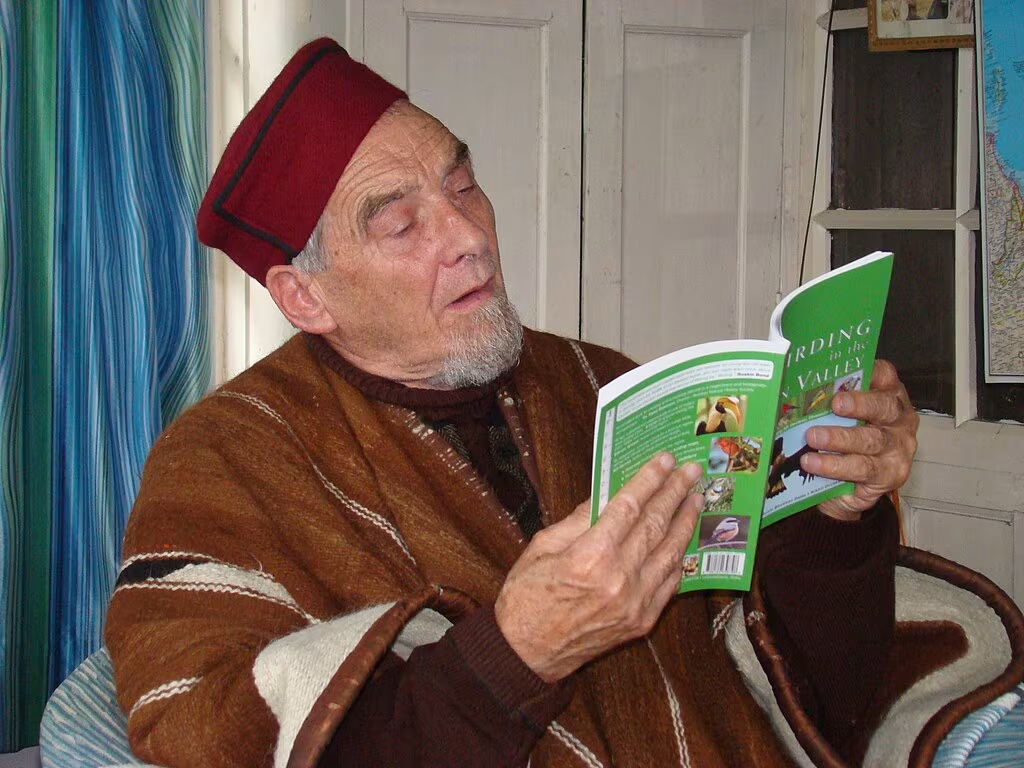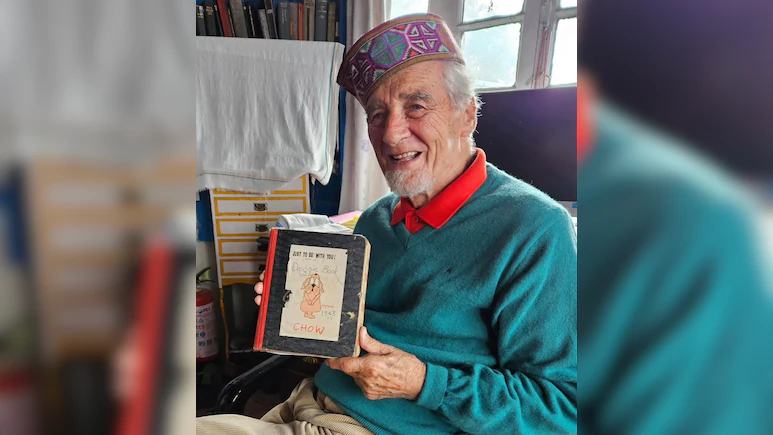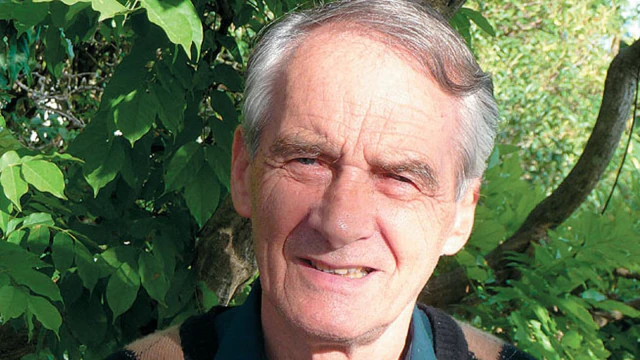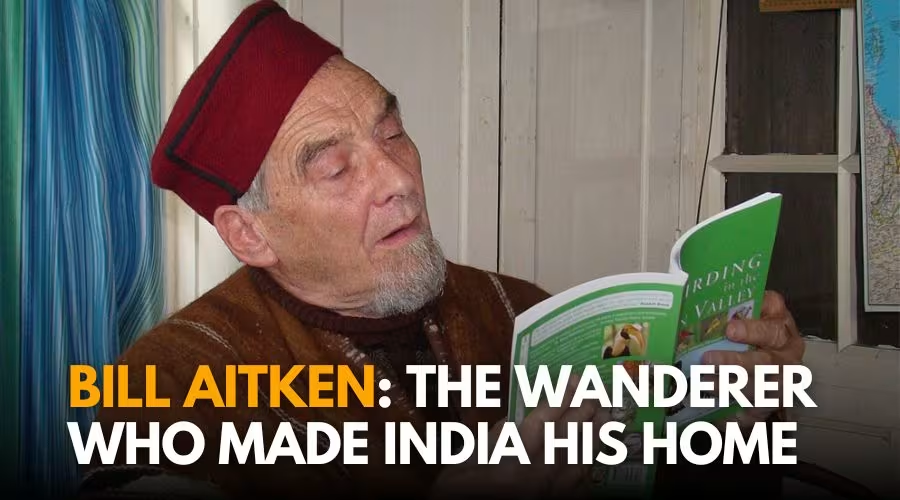The Road Less Taken: A Tribute to Bill Aitken
“With its astounding array of human types and sublime array of beauty, anyone exposed to marvel’s becomes a natural patriot.” — Bill Aitken
For those who grew up traveling through pages before they ever set foot on a trail, Bill Aitken was more than a writer. He was a window into the vast, mystical soul of India. His prose didn’t just describe landscapes; it lingered in the memory like mist on Himalayan ridges. And now, as we write about William McKay Aitken, our beloved Bill sa’ab our hearts ache. For when the writers we love leave this world, a little part of us leaves with them.
Born in Clackmannanshire, Scotland, in 1934, Bill Aitken studied Comparative Religion at the University of Leeds. But his education went far beyond the classroom. In 1959, armed with an adventurous spirit and a hitchhiker’s thumb, he set out eastward not by plane, but overland, through Europe, Turkey, Iran, and Pakistan.

He arrived in India by chance, low on funds and full of curiosity, intending to pause briefly before continuing his journey. But as fate would have it, India stopped him in his tracks and would become his forever home.
“Fatefully, my hand alighted on Shipton’s Nanda Devi, the reading of which smote me with an intensity never felt before or since,” Aitken once recalled.
That unexpected moment in Kolkata’s Asiatic Society Library marked the beginning of a life transformed. Enchanted by the Himalayan goddess, Nanda Devi, Aitken abandoned all plans of further travel. Instead, he set out to follow in mountaineer Eric Shipton’s footsteps. It was the kind of turn only a true seeker embraces.

From the chalkboards of Hindi High School in Kolkata to the meditative stillness of ashrams in Kausani and Mirtola, Aitken’s early years in India shaped the quiet, reflective lens through which he would later write. His love for the mountains ran deep not just in the beauty of peaks and rivers, but in the lives, politics, and ecology entangled within them.
In the 1960s, Aitken moved to Mussoorie. It was here, in Oakless Cottage, where he lived alongside his dogs and countless stories. He became secretary and close companion to Rajmata Prithwi Bir Kaur of the former Sikh princely state of Jind.
His guru at Mirtola had once lovingly called him “our master baker.” Indeed, whether it was baking bread, traveling by train, or writing books, Bill gave everything with his gentle sincerity.
He became an Indian citizen in 1972. And though he lived a quiet life in Mussoorie, those who met him locals, fans, fellow wanderers always left with a smile, enchanted by his warmth and his classic Scottish humour. Dr. Tania Saili Bakshi, writing about her visit on his 90th birthday, remembered him as “full of warmth and good Scottish humour… thrilled to see ma and me… in the best of health and spirits, if you take away the usual twinges in the hinges.”
‘Bill is one of the reasons for my Himalayan obsession. His books are still my go-to source when I write about old trek routes and locations,’ says Bhuvi Uniyal.
Aitken’s writing was never hurried. Like his motorcycle rides through Ladakh or steam train journeys across the plains, his sentences moved at the pace of wonder.
Bill Aitken’s Books :
- The Nanda Devi Affair, 1994
- Footloose in the Himalaya, 2003
- Touching Upon the Himalaya: Excursions and Enquiries, 2004
- Branch Line to Eternity, 2001
- Seven Sacred Rivers, 1992
- Zanskar: The Hidden Kingdom, 1999
- Divining the Deccan, 1999
- Riding the Ranges – Travels on my Motorcycle, 1997
They tell stories of places and people often missed by mainstream travel narratives.
He once wrote, “The railway gives you India like nothing else can.” For him, it wasn’t just transportation, it was a revelation. Whether riding camels in Jaisalmer or watching toddy-tappers in Telangana, the railway connected India’s vast cultural canvas. His passion even led him to serve as president of the Friends of the National Rail Museum and honorary librarian of the Himalayan Club.

But Aitken was not merely a romantic wanderer. His was a sharp, insightful pen, especially when it came to the environment. He spoke out against the exploitation of the Himalayas and mountaineering practices that disregarded ecology. In The Nanda Devi Affair, he grieved how the Indian Mountaineering Foundation raised peak fees for Nanda Devi, making it inaccessible to ordinary Indians. He called it a “classic case of bureaucrats taking careful aim and shooting themselves in the foot.”
He warned of the dangers of militarisation in Uttarakhand, noting that India’s own defense operations were sometimes more damaging to Himalayan forests than any potential invader. After the devastating floods of 2013, he wrote in the foreword of Hridayesh Joshi’s Rage of the River: “The moral of the Kedarnath disaster is to think ahead and plan for the next big upheaval.”
Despite such serious concerns, Bill was full of laughter. Friends recall evenings filled with music, tea, and impromptu adventures. Once, while trying to fetch a guitar for a party, he returned breathless only to open the case and find it empty. “I’m aching all over,” he chuckled. That laughter, they say, never really left him.
His journeys, whether on foot, motorbike, or steam engine were marked by a love for India’s diversity. He documented the temple towns of Palani and Sabarimala in the south, immersed himself in Garhwali and Hindi in the north, and became a true chronicler of the Indian soul. “Whether it’s boatmen on the Brahmaputra or toddy-tappers in Telangana,” he wrote, “India gives more than it takes.”
In his final days, he stayed in his beloved Oakless Cottage in Mussoorie. A fall while overseeing repairs led to his being rushed to Dehradun, where he passed away on April 16, 2025, aged 91. And with his passing, a luminous chapter of Indian travel writing comes to a close.

“Bon voyage, Bill sa’ab,” wrote Saili in her tribute. “May your journey extend beyond the characters you vividly depicted in your books.”
He wasn’t just a travel writer. He was a bridge between nations, between solitude and society, between the sacred and the everyday. As we remember Bill Aitken today, we remember a man who didn’t just see India; he felt it, absorbed it, and gave it back to us in the form of words that now echo in valleys and along railway tracks.
A bit of us dies, too, when the authors we love pass away. But Bill Aitken lived a full life, and in his stories, he continues to live on. So next time you take a train through the ghats or sip tea in a hill station, think of Bill Sa’ab, who once passed that way and left it just a little more beautiful than he found it.
Fun & Lesser-Known Facts About Bill Aitken
- He once wrote under the name Liam McKay-his middle name, used during freelance gigs. This adds a touch of mystery and shows the depth of his literary life.
- Before becoming an author, he was known as the “Master Baker” at Mirtola Ashram, where he baked bread for fellow residents.
- He arrived in India in 1959 by hitchhiking across continents, long before the “Hippie Trail” became a thing.
- He once added an extra wheel to his Jawa bike for a Ladakh trip, a true piece of Indian jugaad that rolled into the Indus River!
- He served as the honorary librarian of the Himalayan Club and President of Friends of the National Rail Museum, championing India’s train heritage.
- He became a naturalised Indian citizen in 1972, nearly 13 years after he first arrived.
- His first sighting of the book ‘Nanda Devi’ in a Kolkata library changed his life; he gave up his round-the-world trip and chose the Himalayas instead.

Leave a Comment